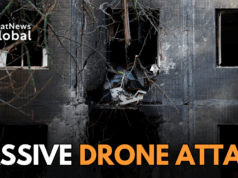
The Israeli strike on Hamas officials in the heart of Doha, Qatar, comes two days after six Jewish civilians were killed at a Jerusalem bus stop by two Palestinians from the occupied West Bank. Does that presume this was Israel’s retaliation for the deaths of its people?
“It could be,” said a former Indian diplomat with long experience of the Arab world. As he put it, “the Israeli strike was disproportionate, which mirrors the killing of over 64,000 Palestinian civilians in the months following the Hamas attack from Gaza on Israel’s southern settlements two years back.”
The Israeli casualties from the Hamas attack was reported at 1,195, so clearly when the Jewish state hits its enemies, it hits hard showing little or no mercy.
That the attack targeted Hamas negotiators involved in parleys to end the war, suggests a cynical view of peace among Israel’s top leadership and even perhaps a disregard for how this attack could impact the remaining Israeli hostages held by Hamas.
Did the US know that Israel was planning a strike of this kind? President Trump says he didn’t know and by the time they got to know, it was too late.
India’s former ambassador to Jordan and Libya, Anil Trigunayat, believes that “The U.S.’s muted reaction against the killing of Hamas leaders in Doha, which is under their own security umbrella, also indicates that for the U.S., Qatar is expendable.”
For the region, it is time to show Arab solidarity. The UAE President Sheikh Mohammad bin Zayed is in Doha, Jordan’s Crown Prince Hussein is also expected and the Saudi King Mohammad bin Salman.
The Saudis and the UAE are known to dislike the Qatari leadership. In fact, in 2017 they enforced a blockade that ended only in 2021. The “bad blood” reflects the role Qatar has played in the region, supporting the Arab Spring of 2010-11 that saw the region’s traditional monarchies come under pressure from mobs in the streets demanding democracy.
Qatar hosts Afghanistan’s Taliban and of course Hamas. It is known to support the Muslim Brotherhood. Add to that close ties with Shia Iran. Not to forget the Al Jazeera television channel which beams programmes and features its Arab neighbours don’t like.
Diplomats say Qatar has leveraged its weight as a “gas giant” to punch above its weight, implicitly threatening the use of the assorted terrorist groups on its soil against its neighbours. And for insurance it has the US Al-Udeid air base on its soil.
But how solid is that insurance? Does it still hold after the Israeli attack? These questions must be warming the deliberations of Qatar’s top leadership. If Hamas could be targeted in this manner, what of the others?
It’s a serious loss of face for the Qatari Emir Tamir bin Hamad bin Thani. His government has vowed retaliation. Could it seek to use the terrorist groups it hosts to target Israel? Will its Gulf Arab neighbours, perhaps egged on by the US, seek to get Qatar to hue to their line which envisages eventual reconciliation with Israel?
More to the point, where will the Hamas leadership go? To Turkey as some are suggesting? Do the Turks want them? How freely will they be allowed to operate. Don’t forget, Turkey is a NATO member.
Trigunayat believes Netanyahu wants to end the war on his terms, by decimating and decapitating the Hamas leadership. The Qatar strike may not have been entirely successful in that regard, but count on the Israelis to persist.




